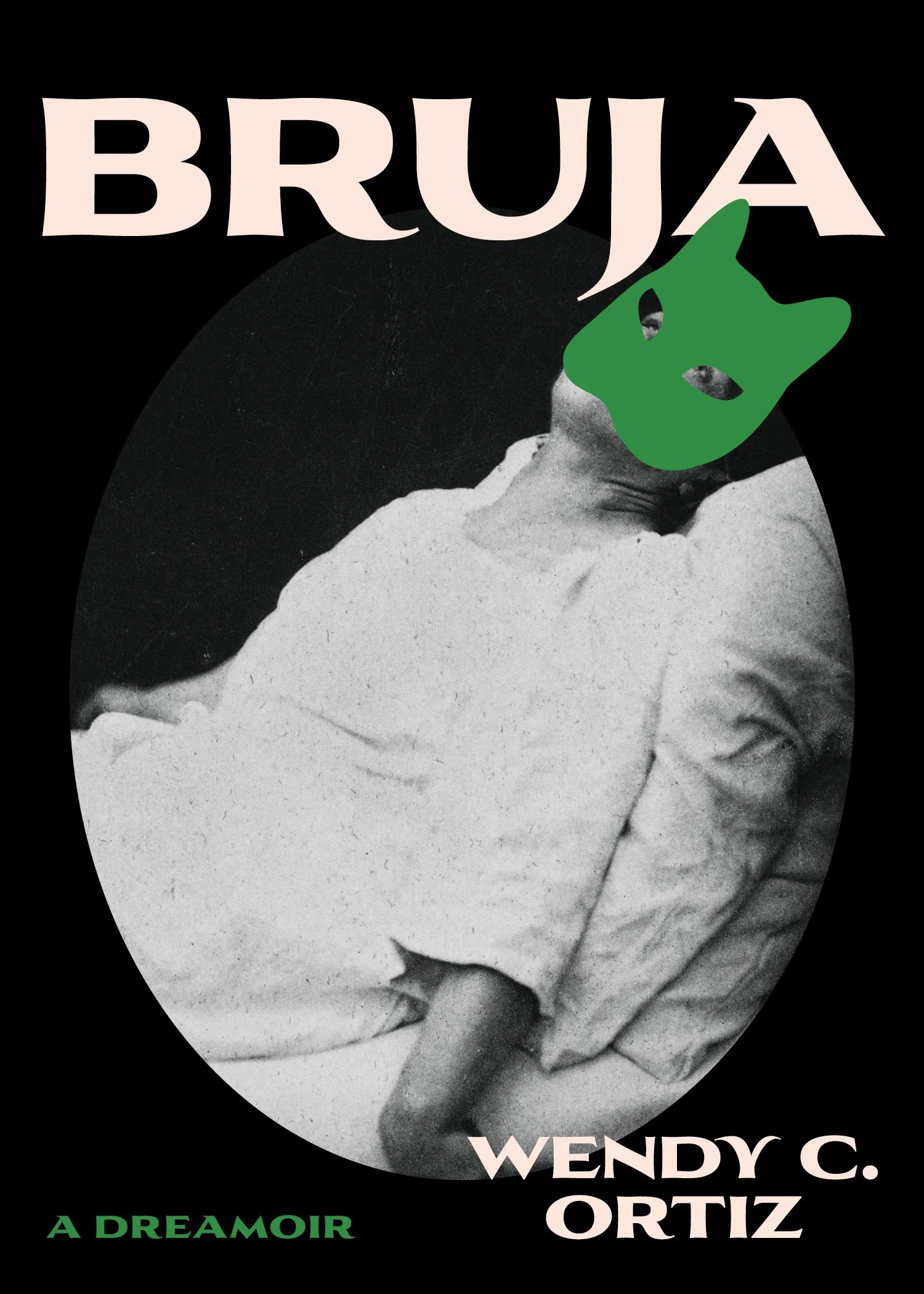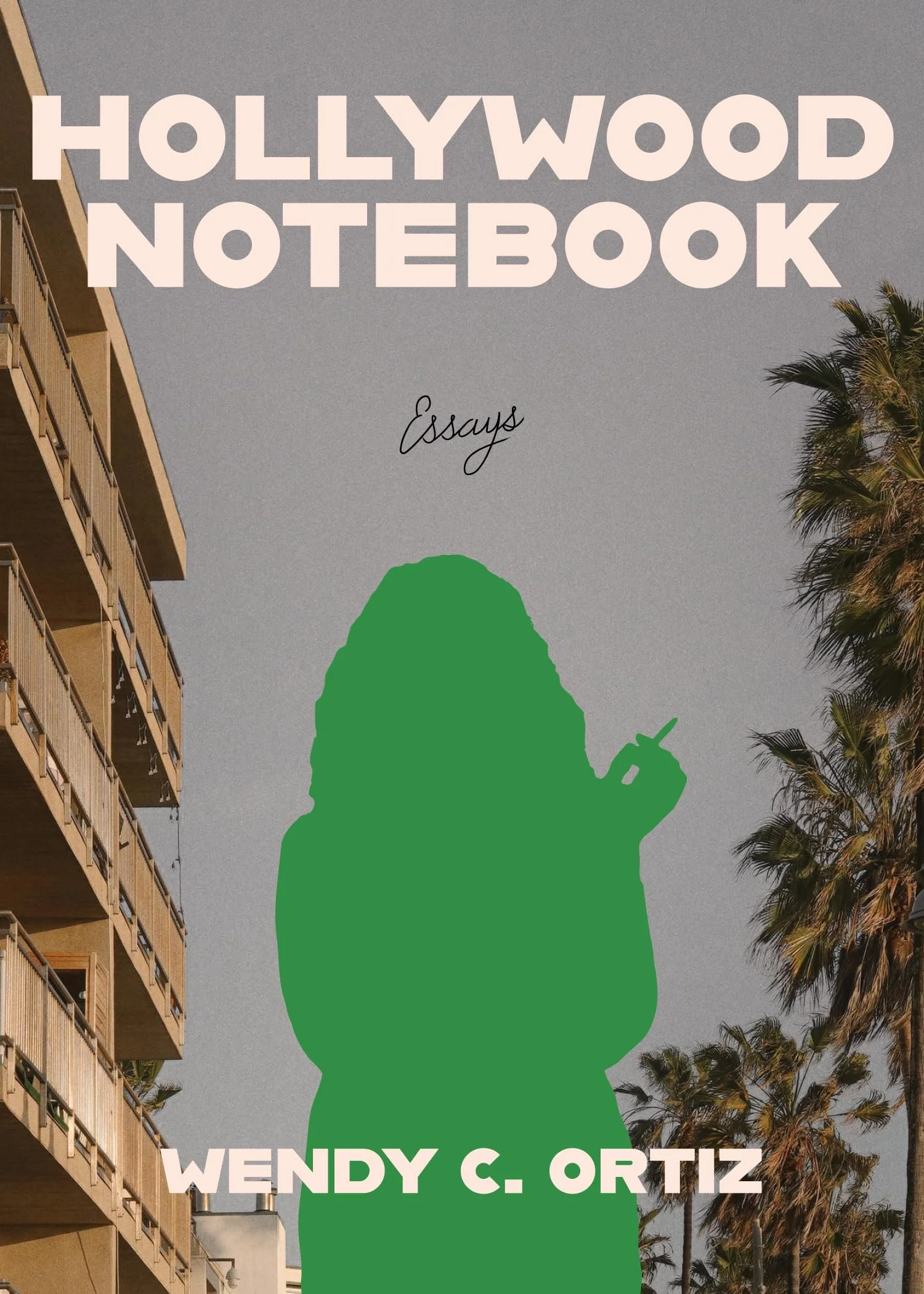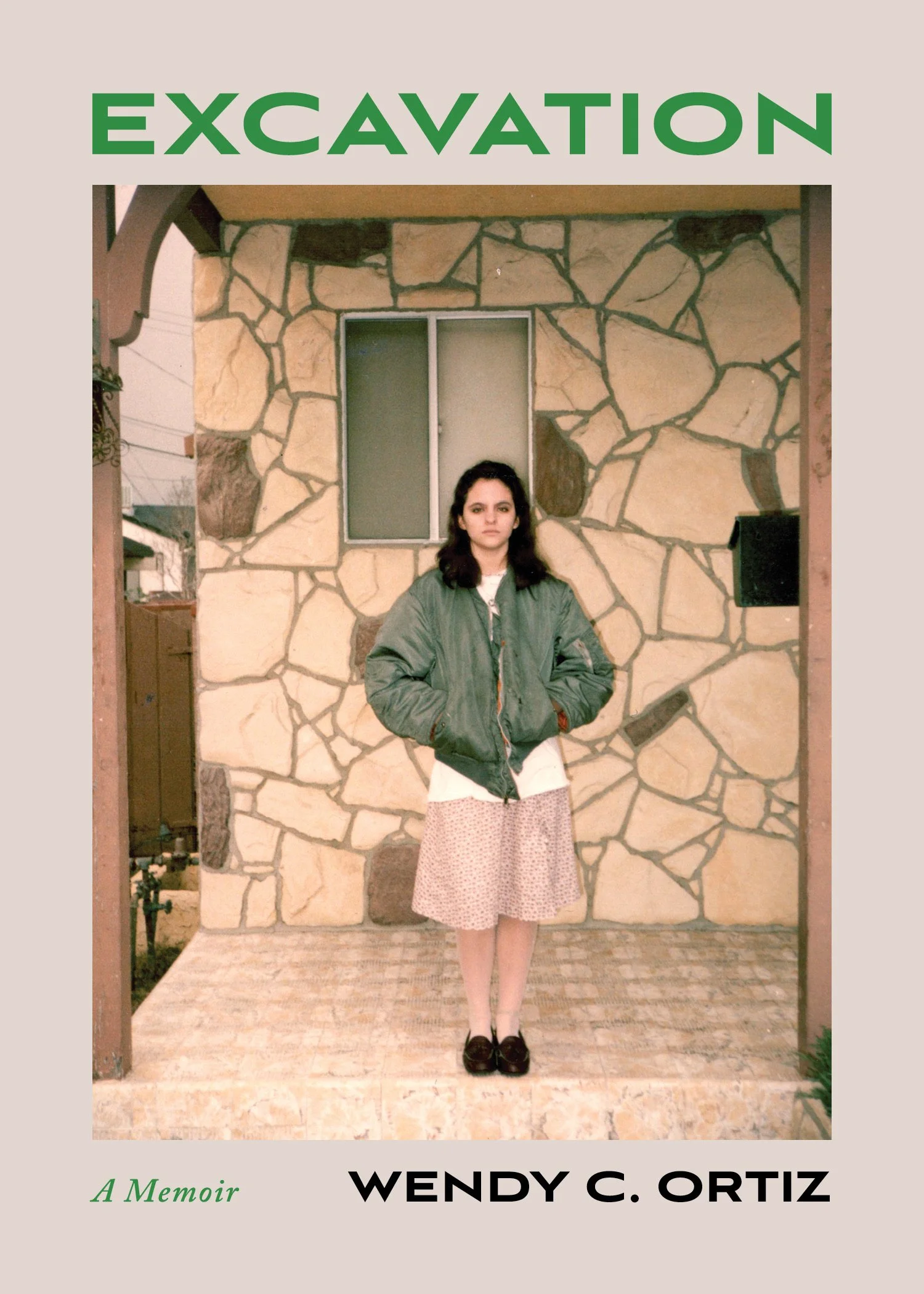- Rejecting fixed Ideas | A Conversation with Wendy Ortiz -
By Mattilda Bernstein Sycamore
Wendy C. Ortiz is a writer of memoirs, and a writer who changes memoir. Her first book, Excavation (Future Tense 2014), which took fourteen years to finish, offers stunning proof that what we are told not to write is always what we need to write. Her second book, Hollywood Notebook (Writ Large Press 2015), examines breakdown and breakthrough inside and outside the creative process. And her third title, Bruja (Coping Mechanisms 2016), reveals dream logic by refusing to make dreams logical, presenting a narrative without direct interpretation, except for the analysis that exists within the dreams themselves. She calls this a dreamoir, placing the text beyond conventional definitions of nonfiction.
All of Ortiz’s books, in fact, allow the reader to roam through the minutia of everyday experience to conjure the sweetness, sorrow, craving, loss, inspiration, brutality, intimacy and frustration of living. Feeling. Flailing. Failing. And, yes, dreaming, in spite of (or because of) it all. Perhaps it’s no accident that Ortiz now works as a therapist.
And now, about a decade after the initial publication of these three books, Northwestern University Press is reissuing all three simultaneously in elegant new editions. In honor of their re-release, I sat down with Ortiz to talk about place-making, the creative impulse, blogging, digression, abuses of power, and the intimate act of claiming one’s own story.
Mattilda Bernstein Sycamore: These three books were published in consecutive years, but were written and conceived over a much longer period of time. The sense of time within the books is also very varied, and so I thought, on this moment of their simultaneous reissue, I would start by asking about time, and how it functions in each of these three books.
Wendy C. Ortiz: Time! Yes, thank you for this question. Time functions strangely in two of the books. Excavation in its initial drafts was very much chronological, and it wasn’t until I landed on the exercise of writing chapters to link up who the adolescent was with who I understood myself to be as an adult many years later that I finally had my final draft. With Excavation, I think of the chapters that jump into the future, whether it’s college years or parenthood, as interstitial chapters, places where a reader might catch their breath, in the midst of the dominant narrative in the book that takes place in the 1980s.
Hollywood Notebook and Bruja have a different relationship to the chronological. These books were largely written at the same time though I had no concept of them as books yet. The majority of the text of each book was being written between 2001 and 2005. Hollywood Notebook was written as a blog called Lab of Lux. Bruja, happening during the same period of time, was being written occasionally online in the same blog, but was mostly handwritten in my journals and notebooks where I tried to keep the focus on dreams. I think of Hollywood Notebook as the daytime life and Bruja as the nighttime life. Aboveground, underground. And even as the aboveground, or daytime, is supposed to be “reality,” it too jumps around in time and place. Bruja is also chronological in that the dreams are separated by months, yet the “action” can’t be described as simply chronological.
MBS: And Bruja, too, is playing with time in a different way because it is a “dreamoir,” a term you use to describe it as a memoir of dreams. I love the way this challenges the notion of traditional memoir, because do dreams really happen? I mean everything is true when you dream it, but what happens when you wake up?
WCO: Yes! I’ve had intense dreams for much of my life and they feel very much like a life that I’m living at night. The places I go to—like, I dream often of “Olympia,” which is less like the actual Olympia, Washington I lived in for eight years but has characteristics in the dream that carry over to other dreams in the years since, so it becomes its own place, or as I think of it, “Olympia-that’s-not-Olympia.” My dreams have given me important things to think about in my waking life, which makes them feel more “real” to me than not. When I wake up sometimes I feel like I have been talking all night—the dreams where I’ve been around lots of people, interacting, moving around to different locations—all of it feels real when I awake. It’s a whole other life.
MBS: Also, you don’t offer any analysis of your dreams, so we have to make our own decisions about what to interpret, or how to interpret. So, in a sense, the reader becomes the dreamer, was this your intent?
WCO: I love that you identify a very rich possibility, that the reader becomes the dreamer. That’s one way to read it. It wasn’t exactly my intent—I was interested in seeing how much could be discerned about a person through what they dream. Since I’ve been cataloguing my dreams for many years, these in particular seemed worth creating a text from primarily because they were happening at the same time as what I was living in Hollywood Notebook. Dream analysis books are interesting texts to me, but I can’t say I’ve used them much. The ones I’ve consulted often felt dated—like there are certain tropes of dream images that are too fixed, Western, hetero-centric, racist, etc.
I want to leave the reader with the mystery, and hopefully the reader will also think about and question their own dream images, like the ones that show up over and over again for them. I think it’s a worthwhile exercise to write about those images without using a dream analysis book. I once had to write a dream analysis for a psychology class and I focused on my dreams about alligators. It involved some research on alligators, but it also made me think of some of my earliest associations with alligators, as well as one animated alligator in a fictional story I had a relationship with, and to track those associations all the way up until the time I was writing about those dreams.
MBS: It also strikes me that digression is a tactic in all of your work—moving into and away from linear comprehension, toward and away from feeling, shifting awareness into something deeper than just one direction or realization, and I wonder if you want to talk about how this complicates narrow notions of “truth.”
WCO: Maybe digression, the way you describe it so beautifully here, is how I think and process in general? I don’t want narrow notions of most things, so, yes, let’s complicate narrow notions of “truth”! Recently I started thinking about how I want to rephrase something I’ve found myself offering to therapy clients and also how I have talked to myself over the years. I used to say, when my mind was spinning with anxieties, “Try to remember the truth of the situation” or “the reality of the situation”—and I’ve been considering how I want to rephrase that, or whether or not I need to. The “truth” of the situation can sometimes change and will certainly differ speaker to speaker. The “reality” of a situation can be subjective. Is it better to say or think, simply, “What is happening right now?” without weighing it down with “truth” or “reality”? I’m still thinking on this.
MBS: One way you do this, I think, is with the recurring motif of the list, especially in Hollywood Notebook, which offers such an interesting snapshot of time and place, and the minutia of creative process. It’s interesting to learn that it originated as a blog, because actually it feels so much like a notebook. The tactile senses, the smells and flavors, I can really see you cooking and crossing things out. So it makes so much sense that you didn’t know it was a book as you were writing it, which enhances the intimacy of the text. When do you know that something is a book, and what inspires you about this form?
WCO: Since both Hollywood Notebook and Bruja began as blogs—before we called such things “blogs”—my audience was a small group of friends and whomever else happened upon them online in 2002 or 2003. When the website came down, I created a couple of Word documents for the writing and dumped all the text into them, figuring that one day I would do something with it. I also had some of the dreams in handwritten form. In 2012 or so, I finally had some time and energy to look at the text and start fashioning it into a “book.” Hollywood Notebook in particular I could envision as a book, a book I wanted published by a small Los Angeles press, since LA figured so much into the writing. Later, when I was solicited for “innovative fiction,” the idea of putting Bruja together as a book arrived. Like, is it fiction, nonfiction, or something else? It was a satisfying experiment to compile the dreams with intention into a book.
With my writing now, I can envision some of it as possibly becoming a book, and some I can’t. I find inspiration by reading books, and wanting to converse with others’ books in my own writing, which might result in an essay, or fragments that I compile over time. For the current book I’m writing, it took a few years of thinking before I could conceive of it as a book, as opposed to just an essay or some essays. Maybe it’s understanding the amount of material and work required that helps me know up front whether it’s a book or not.
MBS: Speaking of the amount of material and work required, Excavation, your first book, is about your relationship as a young teenager, starting in eighth grade, with a teacher who was double your age. You show this with such detail, mostly through your eyes as a teenager, and sometimes as an adult writing it, and one of the things that’s remarkable about the book is that you don’t directly condemn his predatory behavior because you are staying in the moment of your childhood awareness, and this actually makes us feel it even more. Was this part of your intent?
WCO: This was absolutely part of my intent. I wanted readers to fully engage with my teenage mind and its limitations. I was aware that if I stated up front “this is a book about sexual abuse,” the reader would probably go into it with some fixed ideas that wouldn’t allow them to understand some of the motivations or conflicted feelings of the adolescent’s experience. I also wanted the reader to feel the weirdness, the uncomfortable-ness, of a perpetrator who was also an early, enthusiastic cheerleader of my writing at a time when I needed that energy, for various reasons. It also took me a few years to completely understand what had happened, what the harm was—I was around nineteen years old when it began to really dawn on me what had happened, and I wanted the reader to get a taste of that.
MBS: Then there’s this moment where you offer this chapter that is a list, “Why I Didn’t Tell,” which reveals so much in such a pared-down way. And it ends with a list of questions that you would ask a girl in a similar situation. That part makes me cry every time read it, just the care and intention and presence. I know that Excavation has found a huge audience, I assume in part because of readers who share similar childhood experiences, and I wonder if you could talk about some of these responses to the book, and the places where it has brought you.
WCO: I understood that once the book was published I’d be receiving people’s reactions and experiences and since then I have also understood that I have no control over readers’ reactions or how the book is read. I’ve received, in the last ten years, dozens of responses from readers. What is always striking to me is when people tell me they have had a similar experience—not exact, not a teacher/student situation, but something else—that involved abuse of power in interpersonal relationships. That readers see themselves in the story, whether or not it was exactly like the situation I describe—is remarkable to me. I’ve received emails where people have shared that they too lived a similar story with a former teacher, and I am honored that they see themselves in my book, but less surprised, because this happens, has happened, all the time. It’s still “any given day,” also the title of a chapter in the book, that I can find a story about teachers or coaches sexually abusing students in the LA Times, and that’s just one source.
“The places where it has brought me” is interesting—I immediately think of unlikely places, like the time I was invited to speak at a city attorney’s office, to folks who had read my book and who work with victims of sexual abuse. Then of course there is the internal place it’s brought me, especially having become a sort of container, or keeper of strangers’ secrets, when readers write to me and share what they’ve gone through and why the book was meaningful to them. I’m not sure I have a name for that internal place, but it lives next to/with my work as a psychotherapist.
MBS: I’m also thinking about place in your work. Two of your books, Excavation and Hollywood Notebook, are so firmly grounded in LA. Obviously this is the city that formed you. How does it hold you—creatively, politically, emotionally—now?
WCO: This is such a great question. LA still contains a lot of places that ground me. When I was a few weeks postpartum and feeling unmoored, the ocean saved me. The mountains I grew up close to and that I get to see on my weekly trips to CalArts, where I’ve been teaching this year, ground me. The specific trail I have walked since 2001 in Griffith Park holds me emotionally. Where I make my home and how I make my home sustain me creatively. How LA holds me politically is something I’ve been asking myself since I returned to LA in 2001. Lately I've been more interested in involving myself with politically aligned groups in LA, even though I have so much weird history with groups that I need to get over! Caring, showing care as locally as possible is important to me, and that is political and can be realized in a variety of ways.
MBS: It’s rare for a writer to have three books reissued at once, and I wonder how this feels to you, both in terms of looking forward and back?
WCO: I appreciate you naming that this is rare, because, yeah, I can’t name when else I might have seen it happen! I don’t have a reference for this. I feel a sense of assuredness I didn’t completely have before—Northwestern University Press has made quite a commitment in publishing all three at once! I feel a sense of relief that all three books have found a home that feels secure and stable. Looking back, I can see how every book felt a little precarious in its existence with its respective small press. Looking forward, I feel like having the books reissued by Northwestern University Press lets me focus a bit more on the book I’m working on now, instead of half-assedly working on keeping the past books in print and afloat whenever I could make the time.
MBS: What’s the book that you’re working on now?
WCO: This book is already four years deep, and in some ways I feel tender about how long it's taking, though I also remind myself constantly that writing Excavation took fourteen years between first draft to book. I've just started rewriting this new book from the draft it's been in the longest. At this moment, the book is a memoir in essays that meditates on the human heart, and how one becomes politicized.
Wendy Ortiz
Mattilda Bernstein Sycamore by Dorothy Edwards
WENDY C. ORTIZ is a writer of creative nonfiction working in hybrid forms, essays, and memoir. She is the author of three books, all published by Northwestern University Press. Her writing has appeared in BOMB, Joyland, The New York Times, Pleiades, Fence, and many other journals. Ortiz is a therapist in private practice in Los Angeles.
Mattilda Bernstein Sycamore (mattildabernsteinsycamore.com) is the award-winning author of three novels and three nonfiction titles, and the editor of six nonfiction anthologies. Her most recent title, Touching the Art, was a finalist for a Washington State Book Award and a Pacific Northwest Book Award. Her new novel, Terry Dactyl, will be out in November from Coffee House Press.





